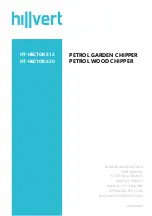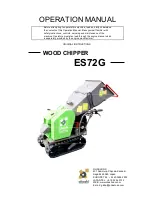
M02
J40
M6-
04
WDAT-3
2.160-3.660
- W AT E R C O N N E C T I O N S -
35
- W A T E R C O N N E C T I O N S -
GENERAL WARNINGS
Piping must be designed with the least possible number of bends and head variations. If the pressure chute of the
installation is above the useful prevalence of the pump, the water delivery capacity is reduced as well as, as a
consequence, the thermal exchange and the yield.
1. INTERCEPTING VALVES
Install on the input and output (of the user parts (exchangers, coils, humidifiers, etc) So that it will be possible to carry
out all the service operations and possible substitutions without emptying the installation.
2. PRESSURE AND TEMPERATURE INDICATOR, BLEEDING COCK
Install on the input and output of the user parts (exchangers, coils, humidifiers, etc) So that it will be possible to carry
out all the service operations and possible substitutions without emptying the installation.
3. AUTOMATIC OR MANUAL ESCAPE VALVES
Install the highest points of tubes in a way that the air can escape form the circuit.
4. LEAKAGE TESTS
Before performing the insulation of the tubes, carry out a leakage test.
5. TUBE INSULATION
All tubes of water must be insulated so that to avoid the formation of condensation and thermal dispersions along the
tubes themselves. Verify that the insulation is the vapor coil type. The connections for the air escape and for the
emptying must be out of the insulating thickness to assure the accessibility.
6. CONNECTIONS SUPPORTS
The weight of the hydraulic connections must be supported in the exterior of the unit. The exchanger connections
must not be stressed.
7. ANTI-VIBRATION DEVICES
In case of units with anti-vibration devices, it is necessary to assemble elastic joints, even on water connections.
8. RISK OF FREEZE
If the unit and the relevant water connections are subject to temperatures near 0°C:
•
mix the water of the system with glycol and/or
•
protect the tubes with heating cables under the tubes insulation and / or
•
empty the system by verifying that in the system or in the unit:
•
no taps are closed so they can not trap the water, even after emptying
•
there are no low points where the water can stagnate even after emptying; blow if necessary
9. INTALLATION EMPTYING
The refilling of the water present in the installation increase the oxidation phenomena and lime deposits: only empty
or refill the installation if necessary.
10. EXPANSION TANK
The installation must be kept at the right pressure by both an expansion tank and a combined valve of pressure
reduction and discharge; if the components are present on the unit, they must be installed on the installation. The
expansion tank must be dimensioned in function of the water in the installation.
EVAPORATOR CONNECTION
1. FILTER
The filter, if not present on the unit, must be installed immediately upstream the unit, in a position accessible for the
cleaning.
2. FLOW SWITCH
The flow switch must be foreseen, because is a system component. It has to be installed in a duct rectilinear part, not
in proximity of curves that cause turbulences.
3. ANTIFREEZE SOLUTIONS
In case of unit use with water temperatures lower than + 4°C avoid the ice forming using antifreeze solutions (ex.
Ethylene Glycol) in the required percentage. The use must be foreseen also in antifreeze function for ambient
temperatures next to 0°C.
4. ANTIFREEZE HEATER
If the unit is equipped with antifreeze heater exchanger side (standard or optional according to the models) check that
they are electrically supplied in the unit stop periods (nocturnal, weekend, long stops).
5. SYSTEM CLEANING
Perform careful system cleaning using clear water and discharging it before the unit connection
VICTAULIC CONNECTIONS
DO NOT WELD THE INSTALLATION PIPE (TOGETHER WITH THE CONNECTION UNION OF THE EVAPORATOR)
WITH THE VICTAULIC CONNECTION JOINT ATTACHED. THE RUBBER GASKETS COULD BE IRREPARABLY
DAMAGED.
1. Take away the supplied connection union by acting on the connection
joint Victaulic.
2. Weld the union to the installation pipe.
3. Perform the connection between the installation pipe and the evaporator,
using the joint.
Summary of Contents for WDAT-3 2.160
Page 2: ......
















































